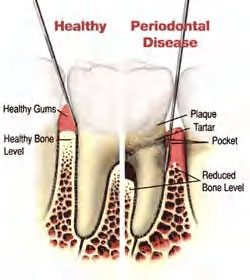Dental Insurance Doesn’t Like to Cover Deep Cleanings
But don’t let that dissuade you, if you need this service.
It is needed for treatment of certain types of gum disease.
In gum disease, you get deposits of tartar or calculus on the root of the tooth. This calculus is made up of bacteria that are embedded in mineral deposits. It is highly irritating to your gums, and is associated with the deepening of pockets in your gum and the destruction of the bony support of your teeth.
Deep cleaning involves
For financial reasons, dental insurance doesn’t like to pay for this higher level service. They also often deny claims when these cleanings are done more often than every six months. In doing this they are putting their own financial interests above the health of the patient. The truly unfortunate thing about this practice is that their policy implies that these services aren’t needed, which causes some patients to question their dentist. But the truth is that it is the truly ethical dentists who genuinely care about their patients who are performing these services.
It is very easy for dentists to place a low priority on treating gum disease. When they do that, they won’t have to hassle with the insurance companies. They can also hire a dental hygienist with a lower level of skills, which may save them money. And the deleterious effects of ignoring the progression of gum disease may not be felt for decades.
But with gum disease, it is strongly recommended that an initial deep cleaning be done using novocain, and it may take as many as four appointments to complete. After the initial deep cleaning is done, maintenance periodontal cleanings should be done every three or four months, depending on the severity of the gum disease and the response seen in the patient’s mouth. In some cases, they should be even be done every two months. These maintenance cleanings, besides being more frequent, require a higher level of skill and take longer than ordinary cleanings, so they are more expensive.
I remember a discussion I had on the phone with a representative from a dental insurance company when they had denied a claim for the maintenance cleaning for one of my patients. They had a policy that they would pay for those maintenance cleanings only for one year after the deep cleaning, in spite of the fact that gum disease never really goes away and the maintenance needs are perpetual. But they wanted to save some money. He would not budge, so finally I told him that what we would do then was re-do the initial deep cleaning each year so that we could fit the patient into their policy. With that he changed and agreed to cover the maintenance cleaning.
—Dr. David Hall.
Click here to ask Dr. Hall a question.
